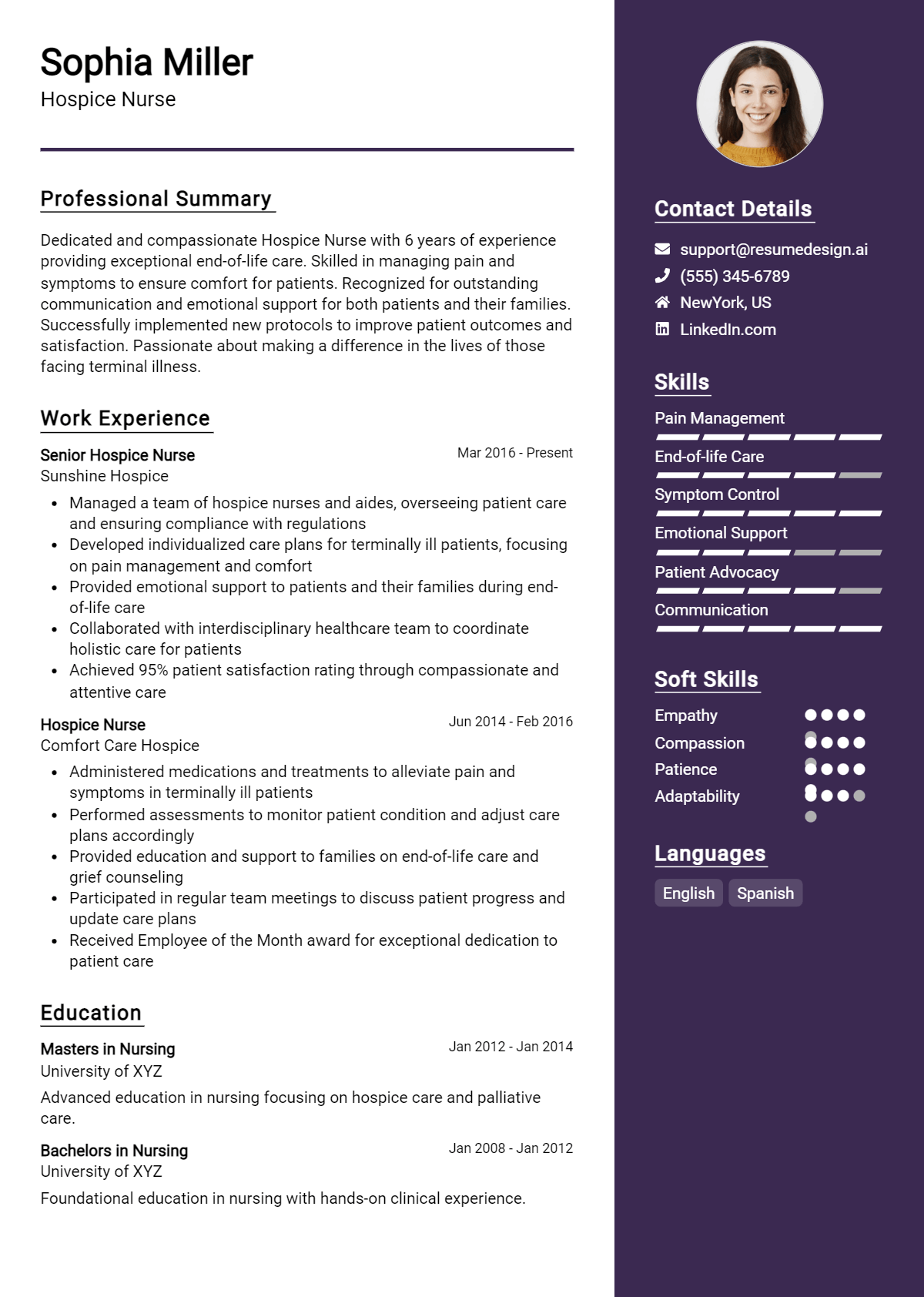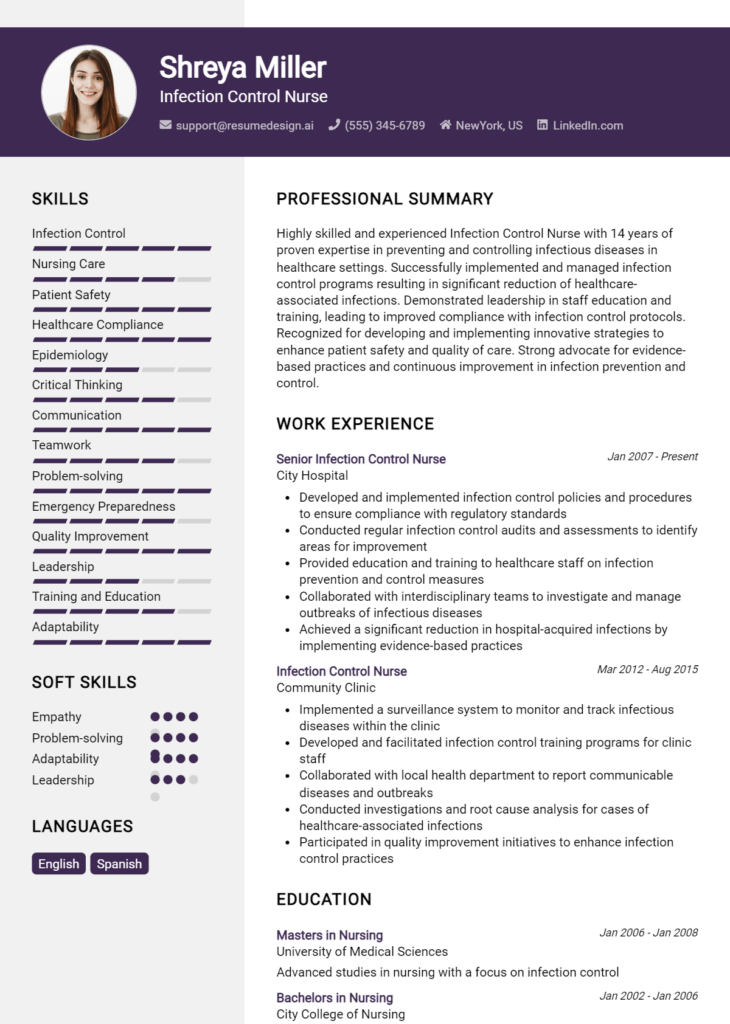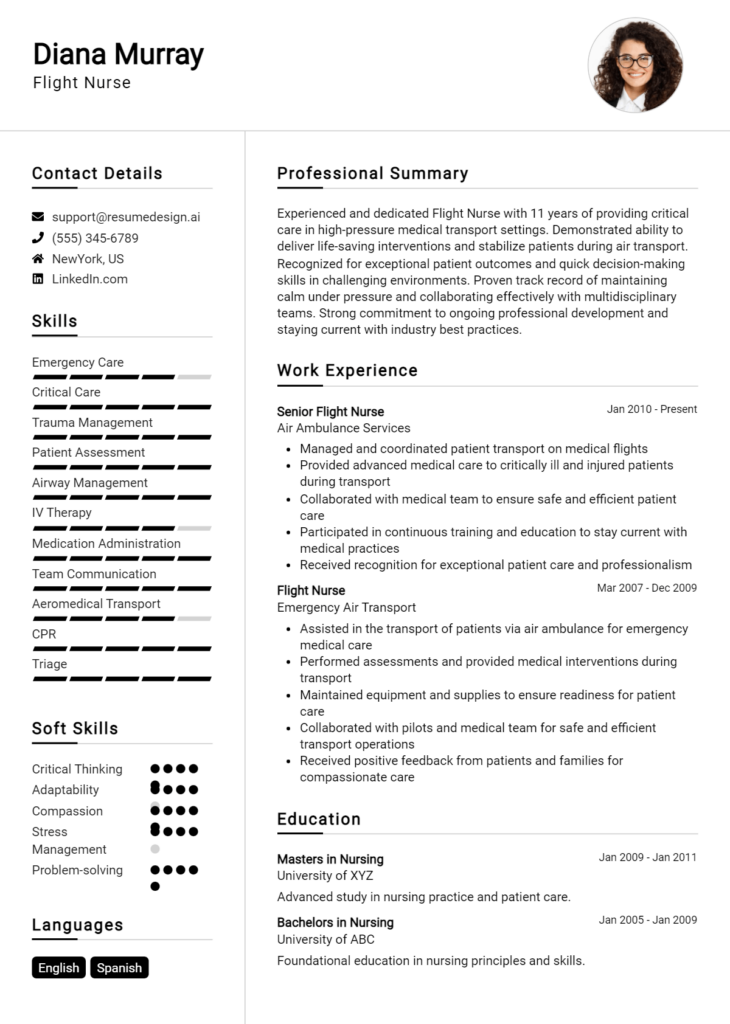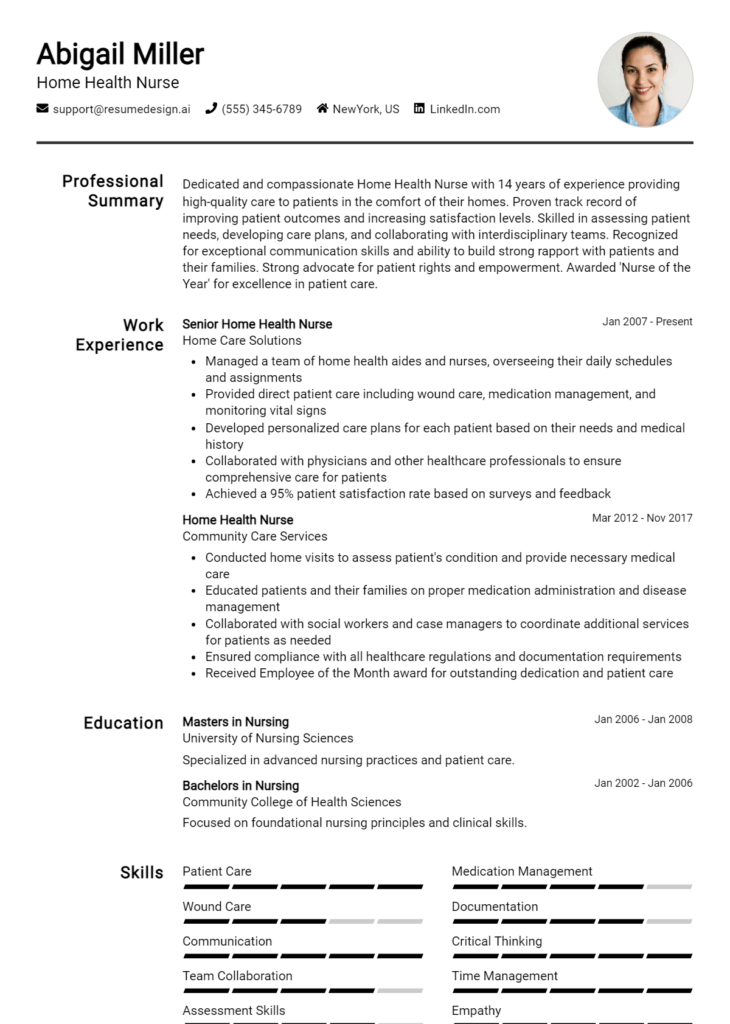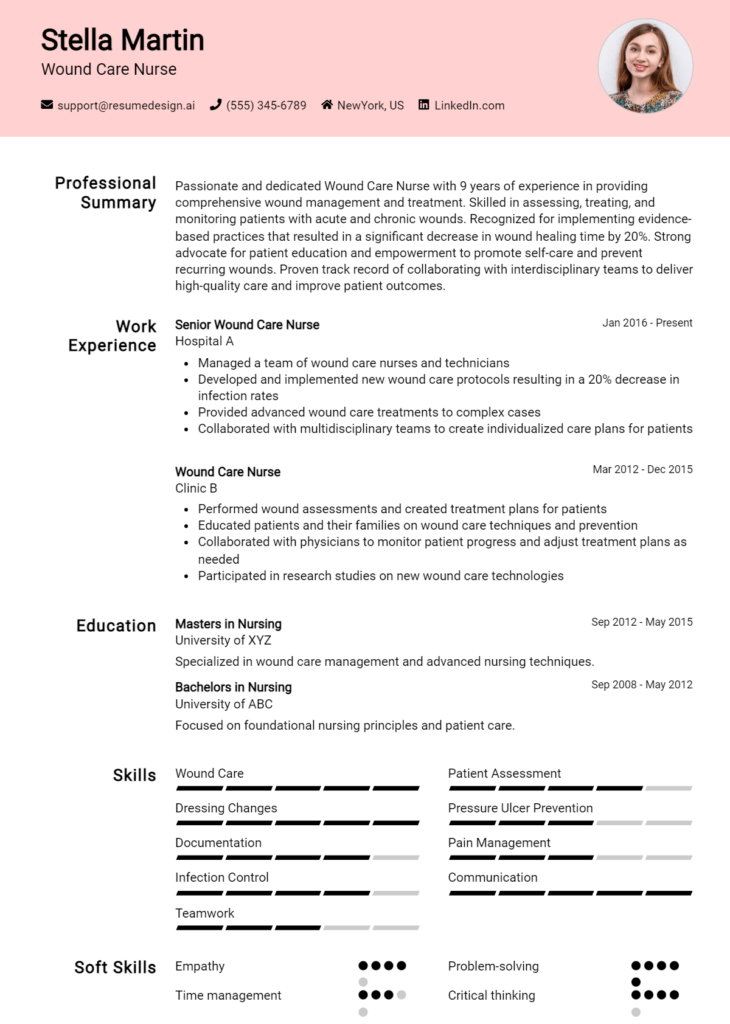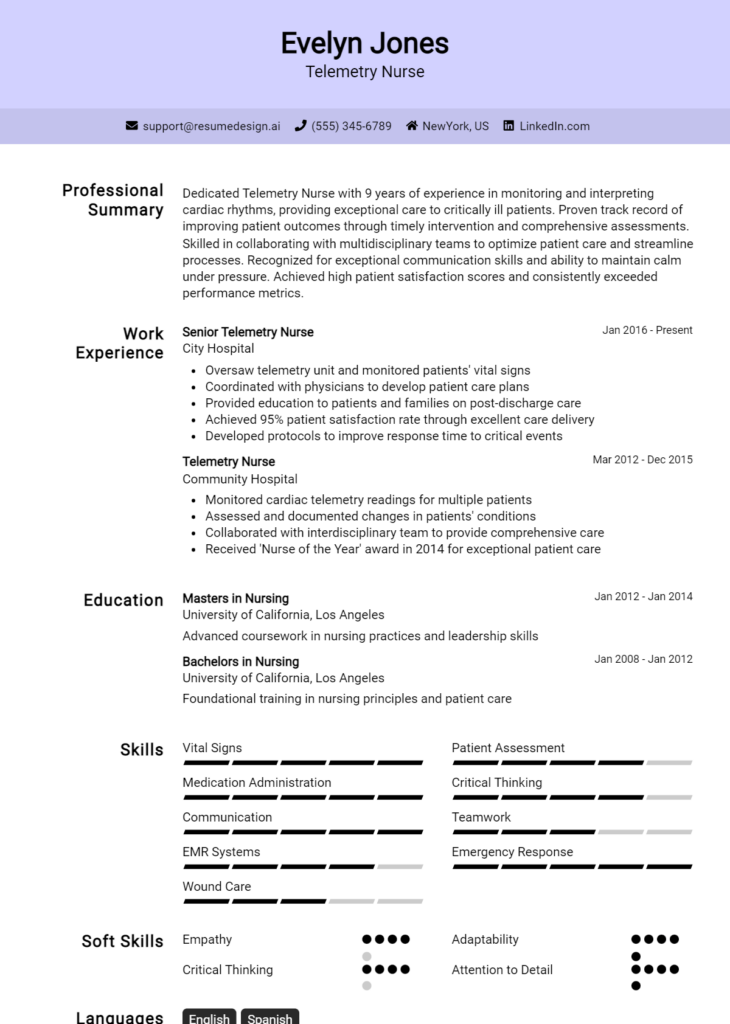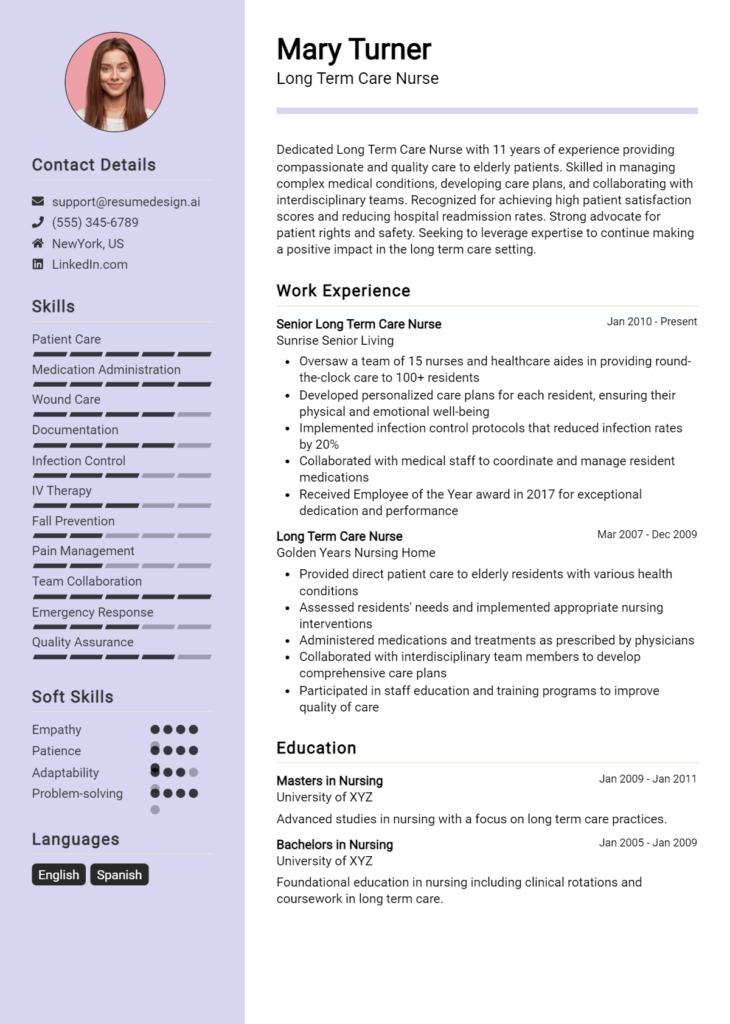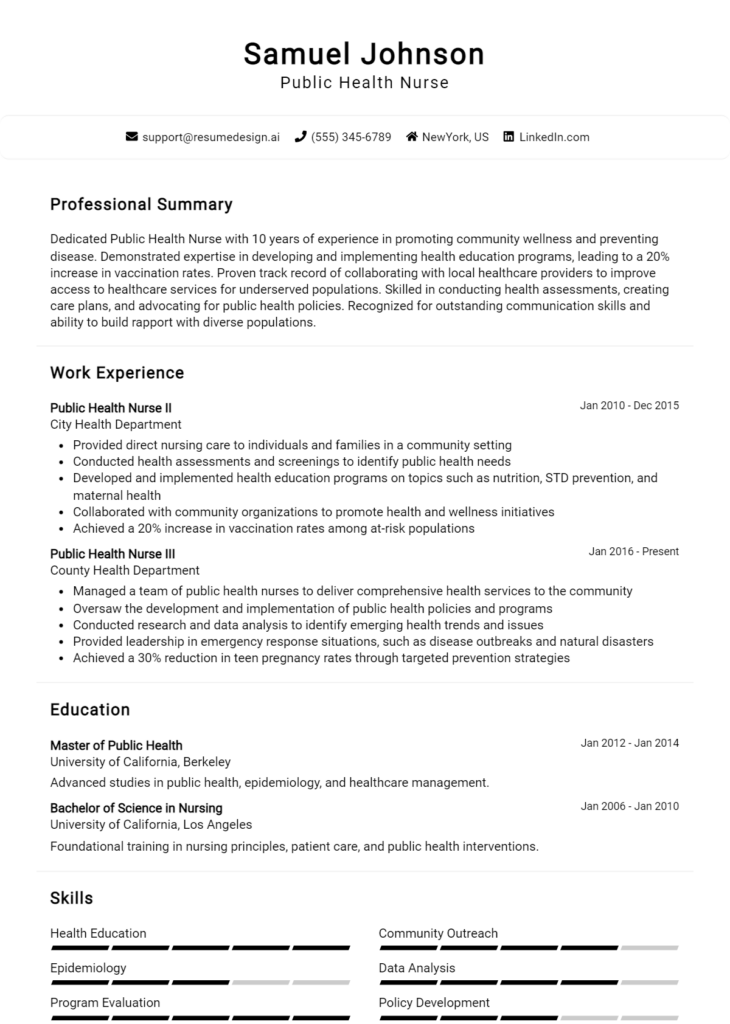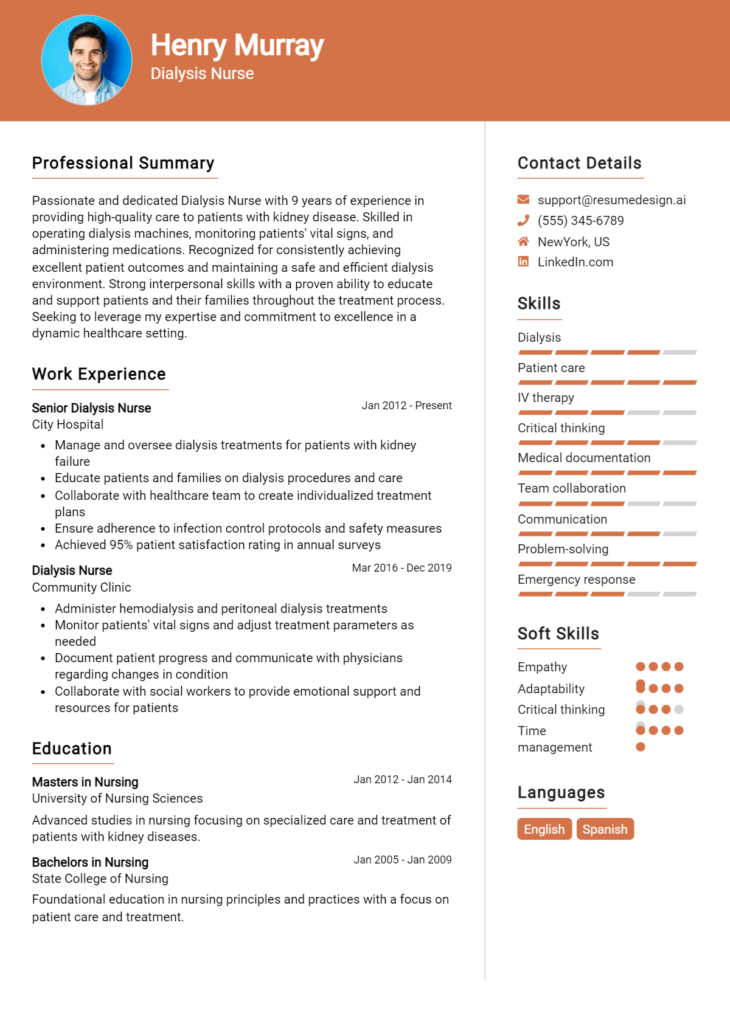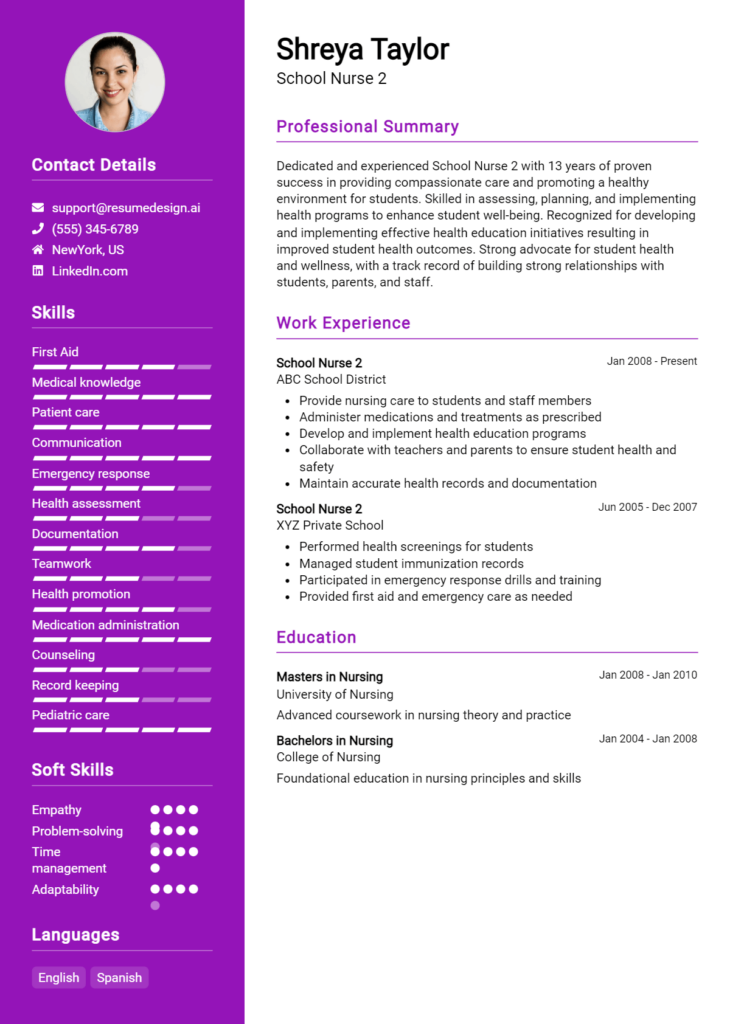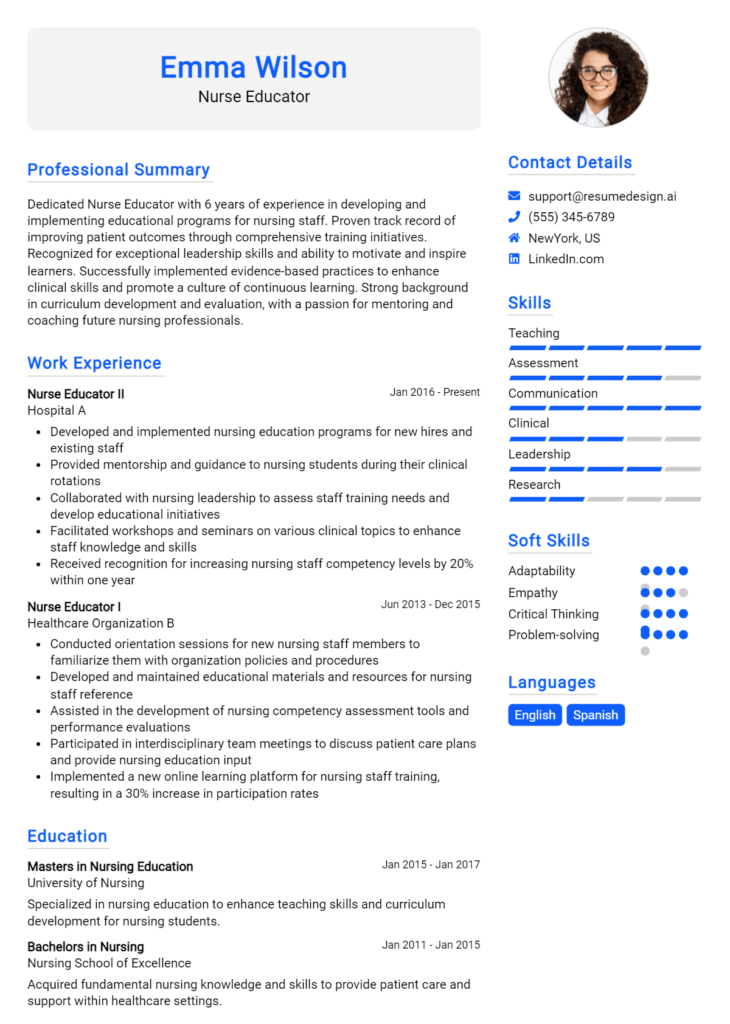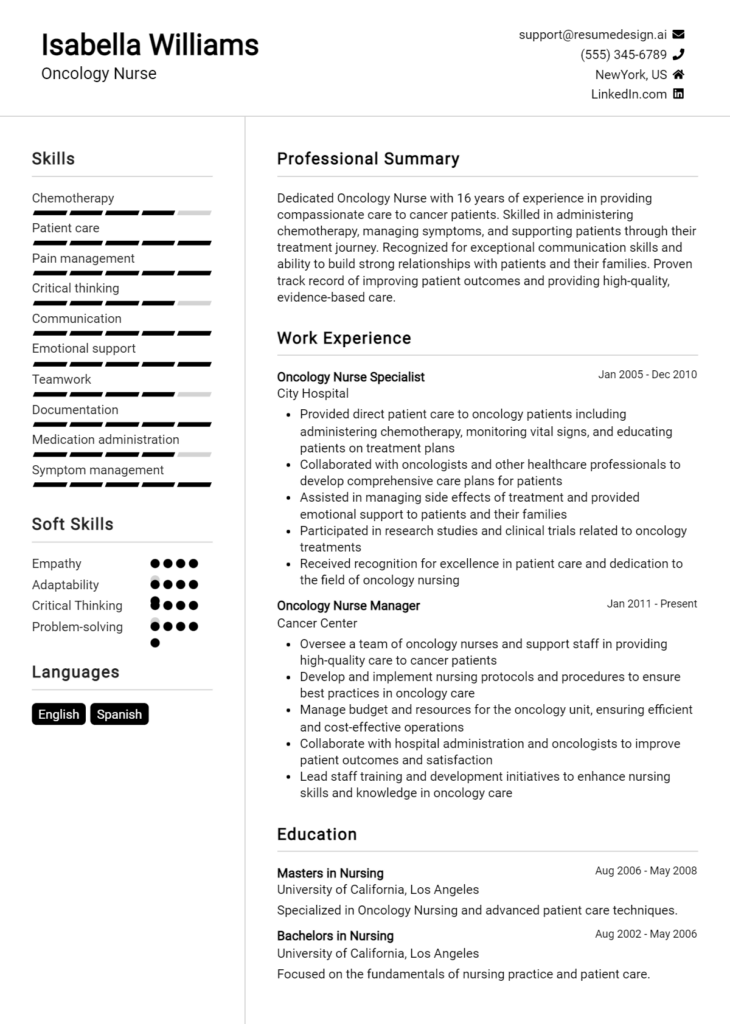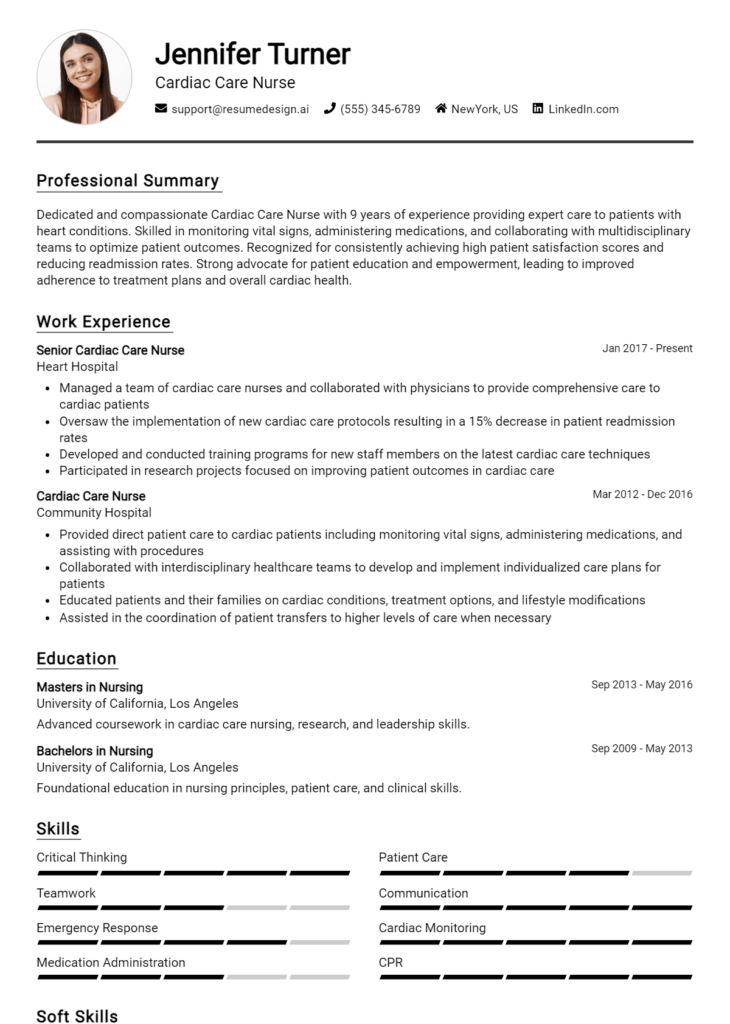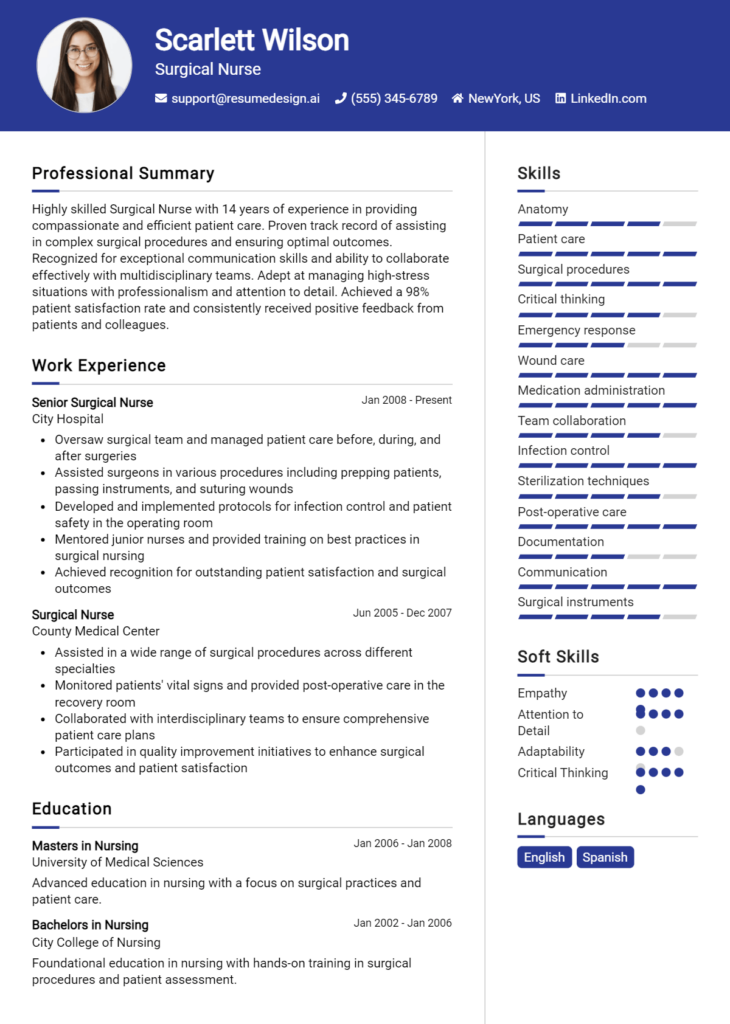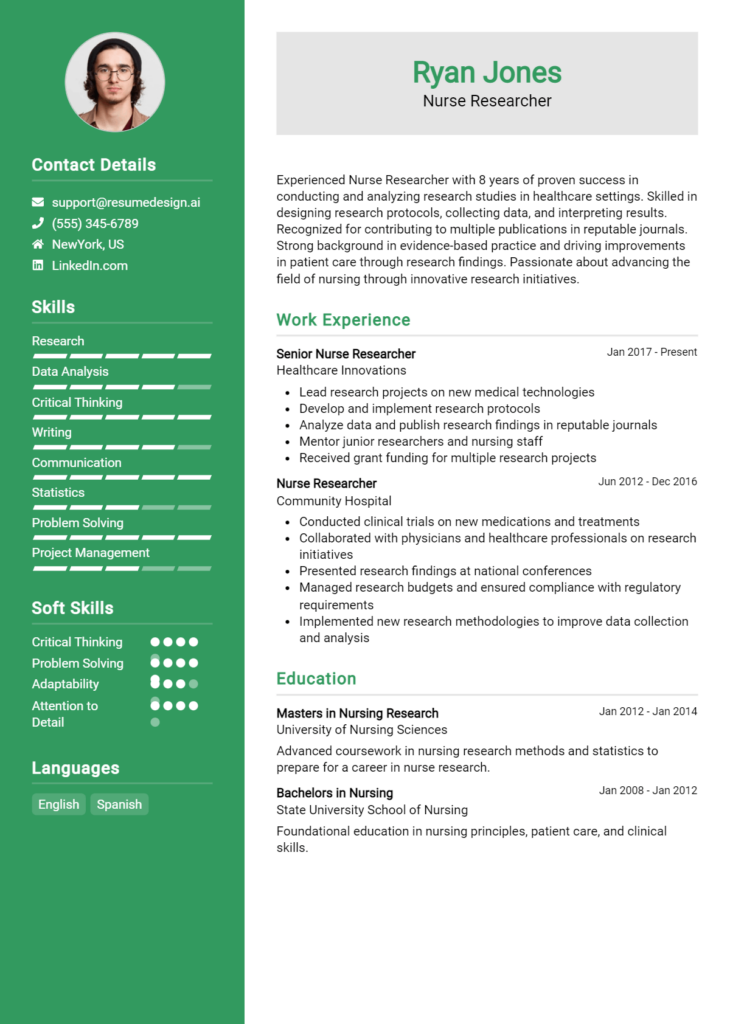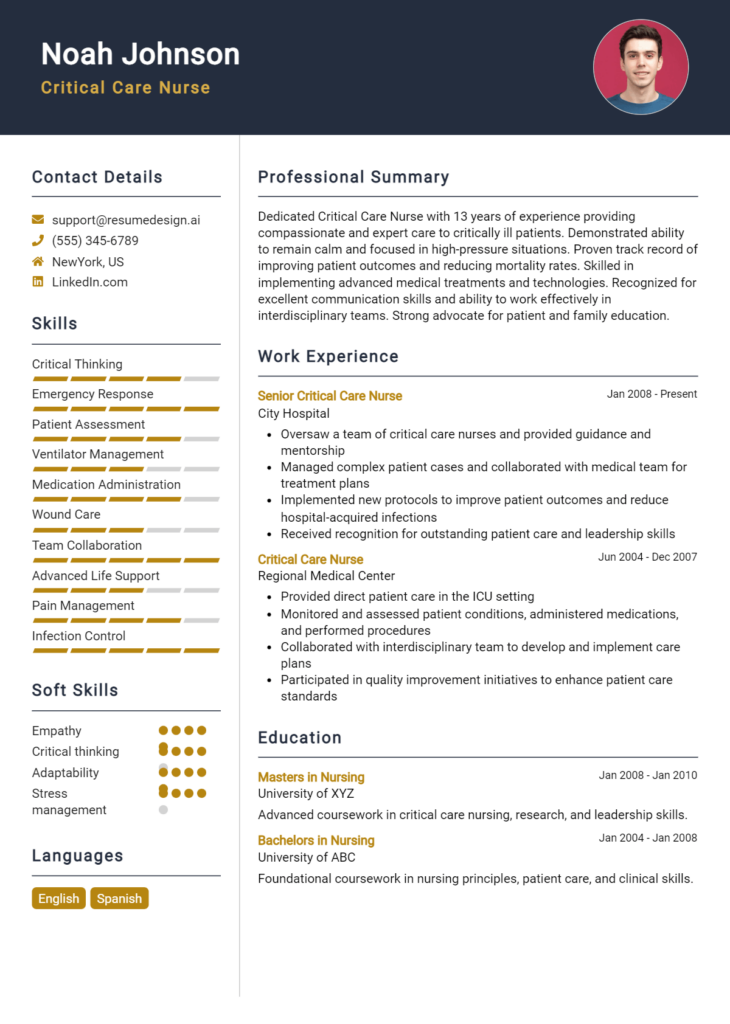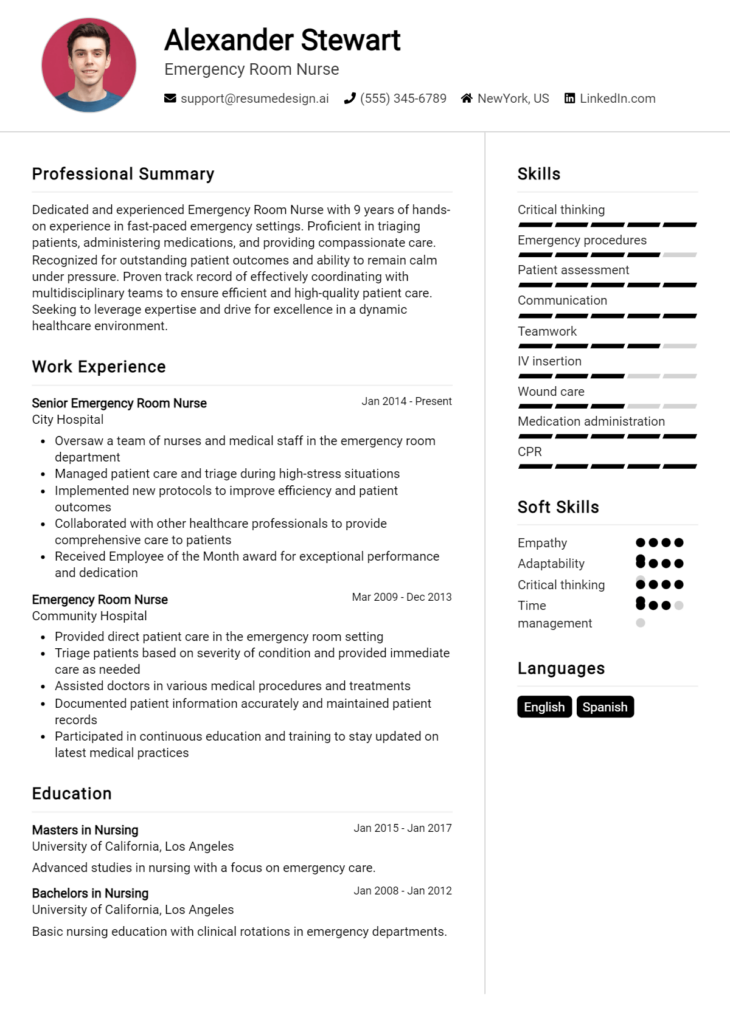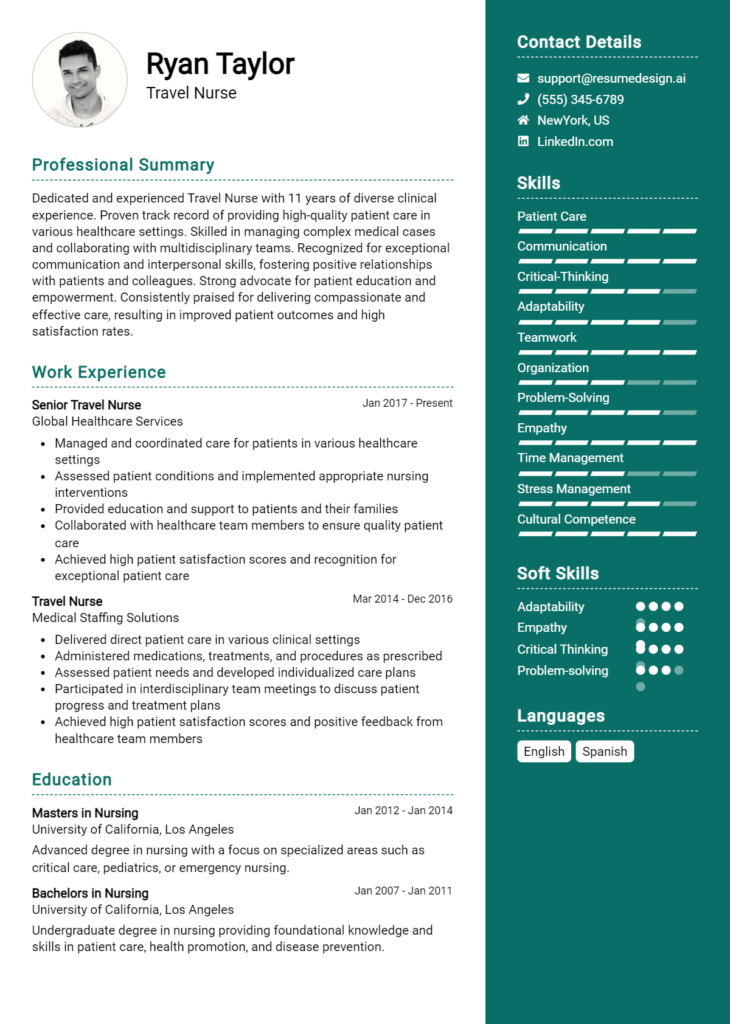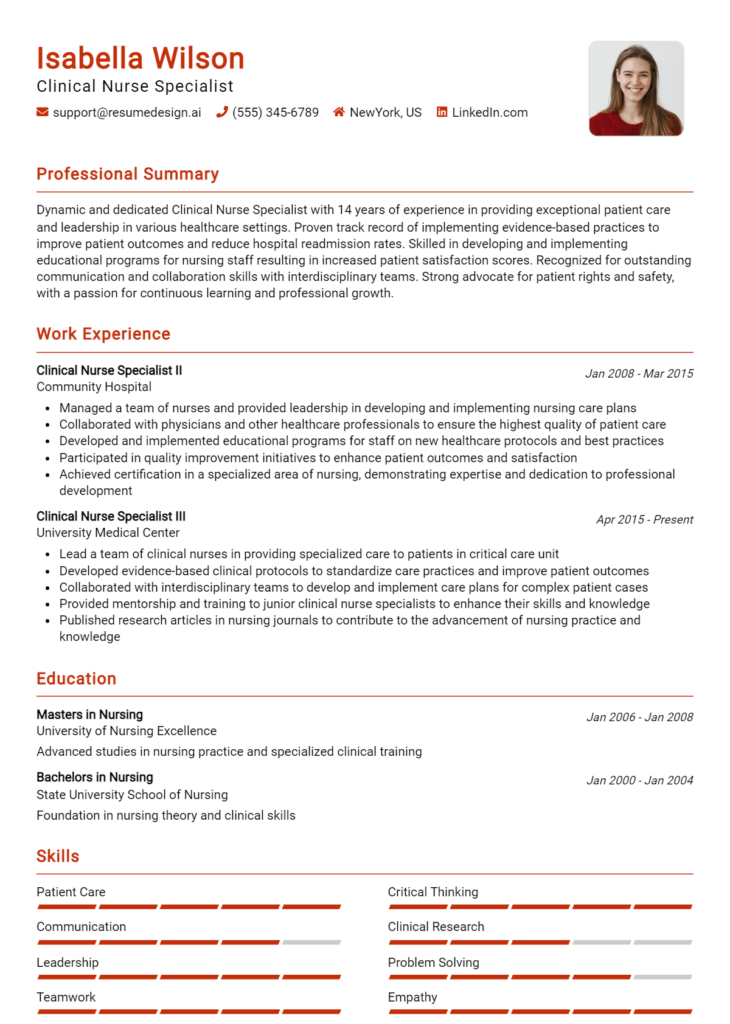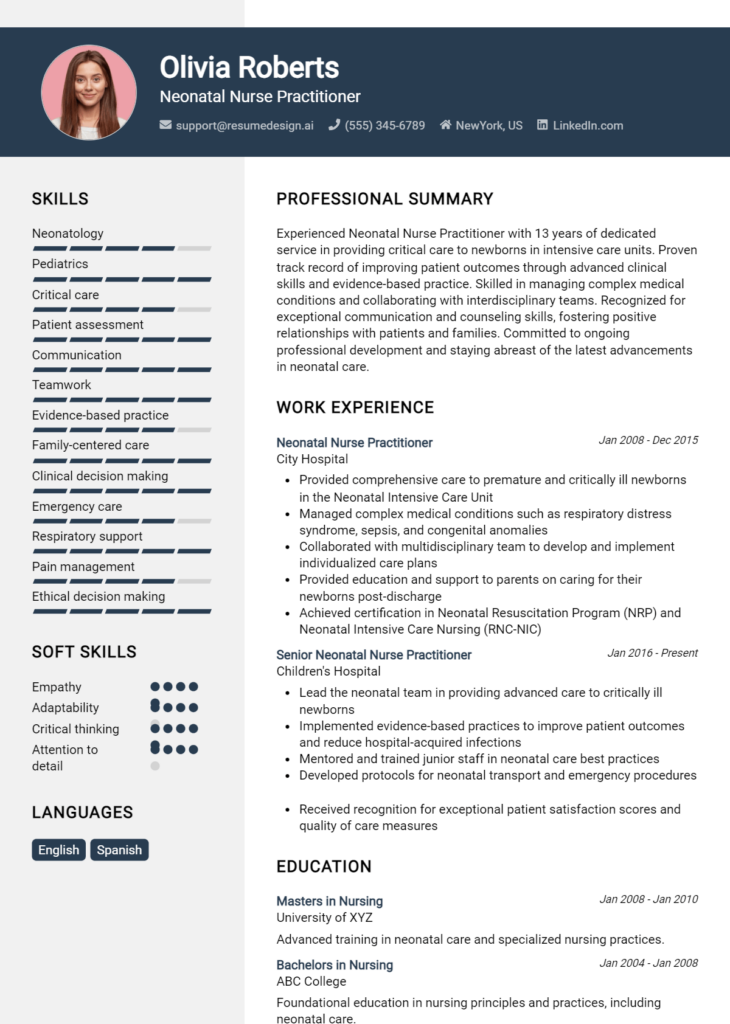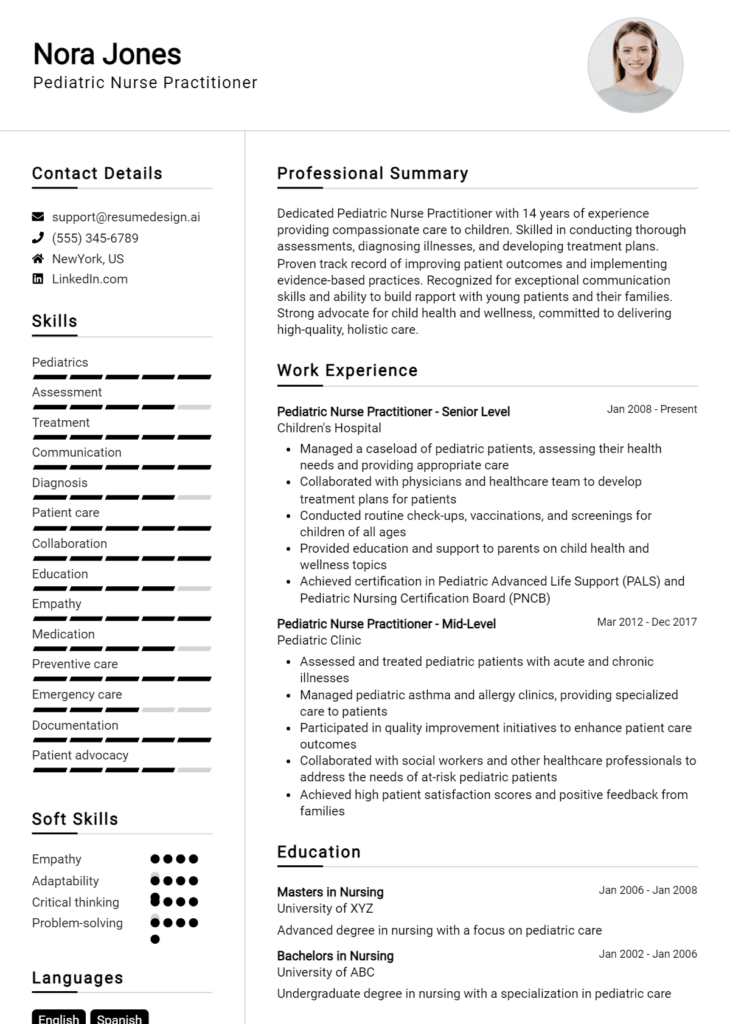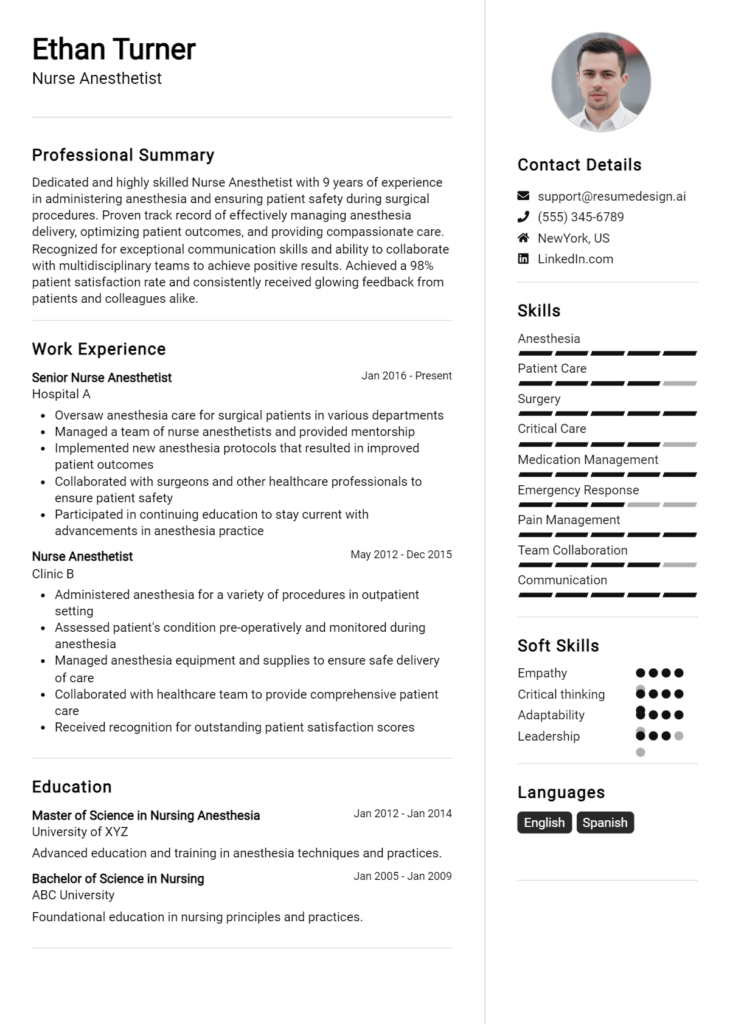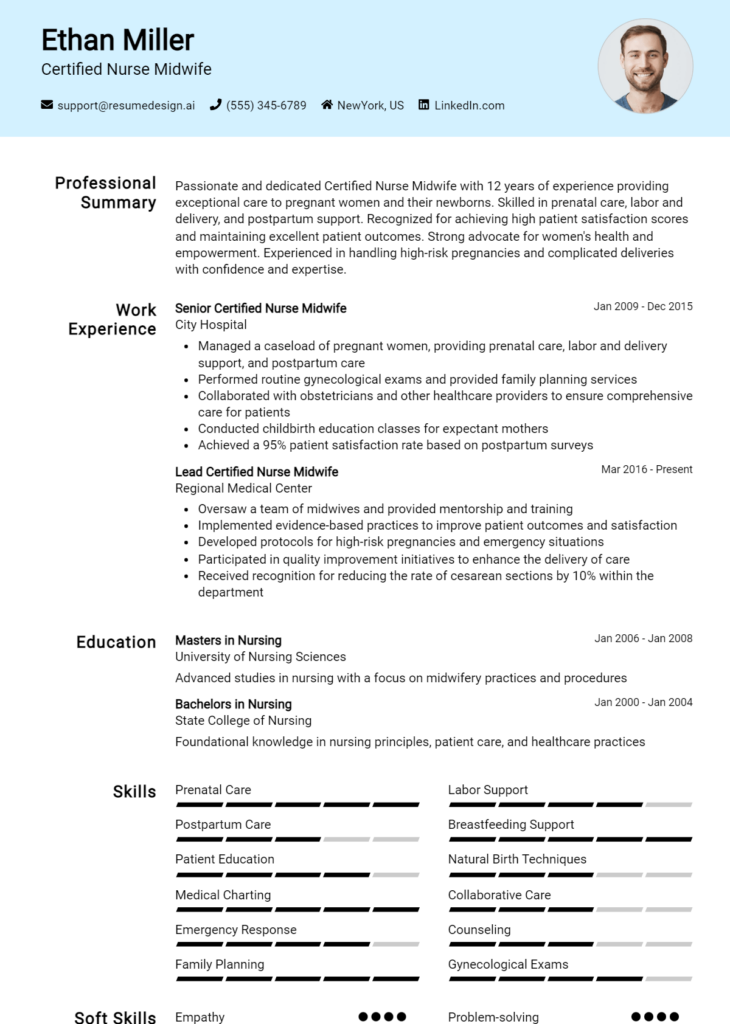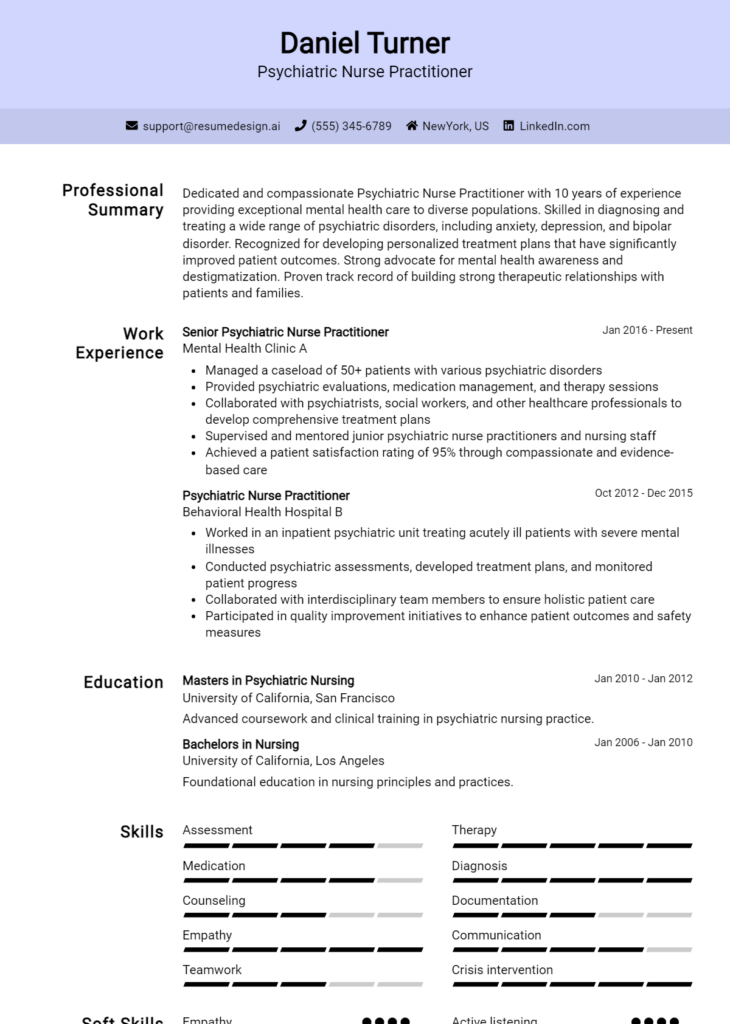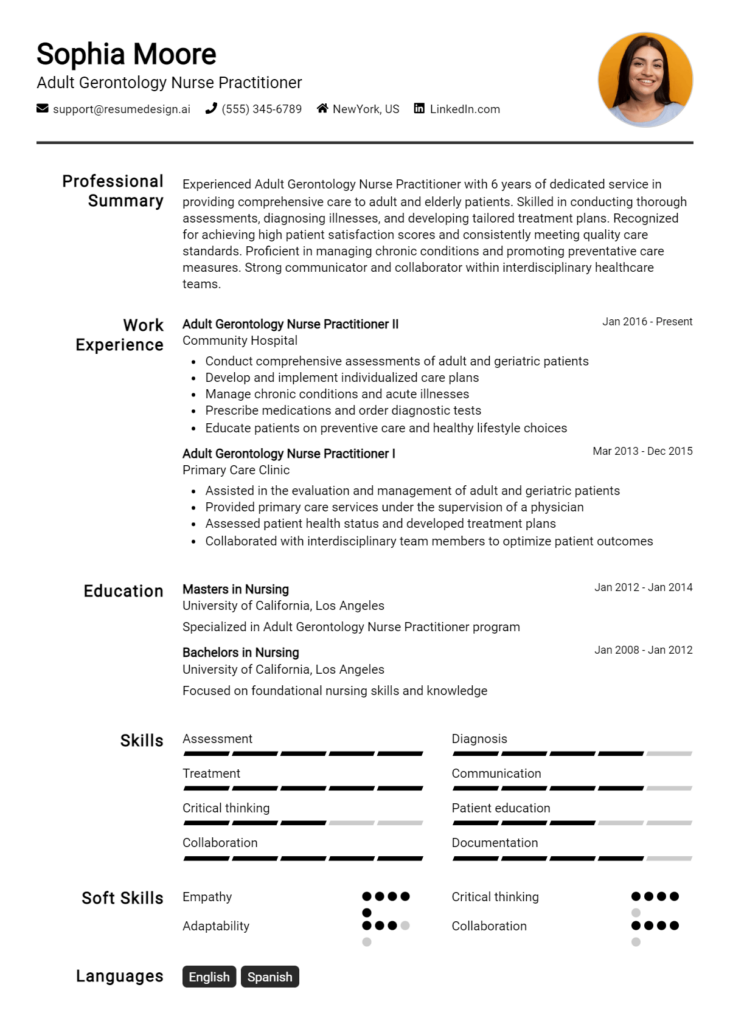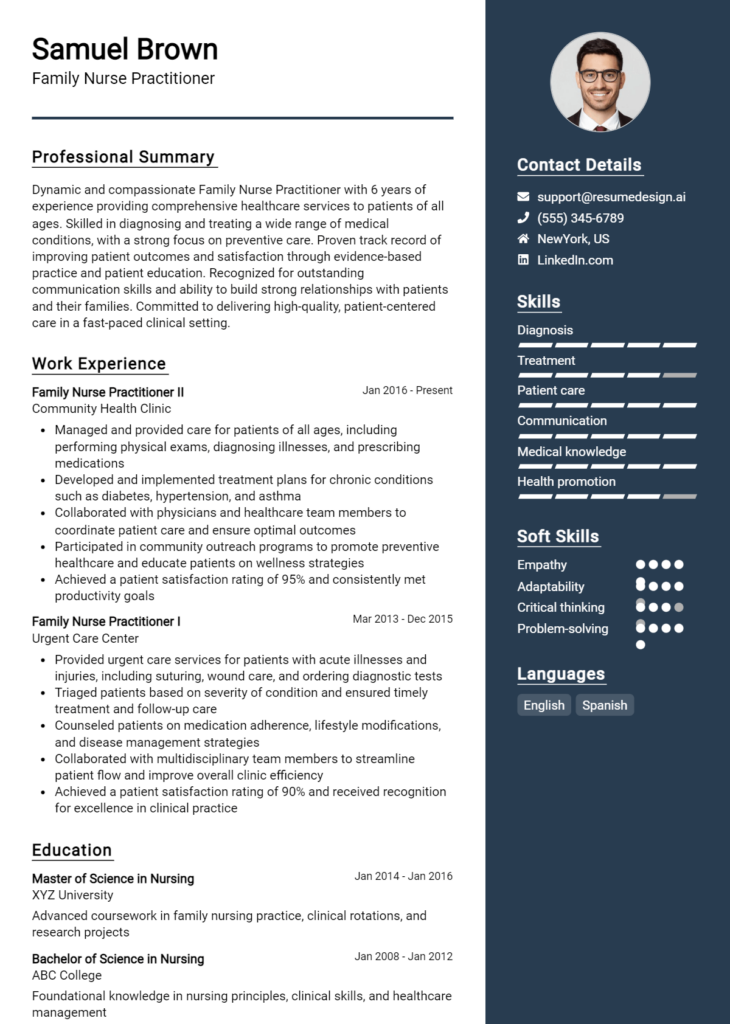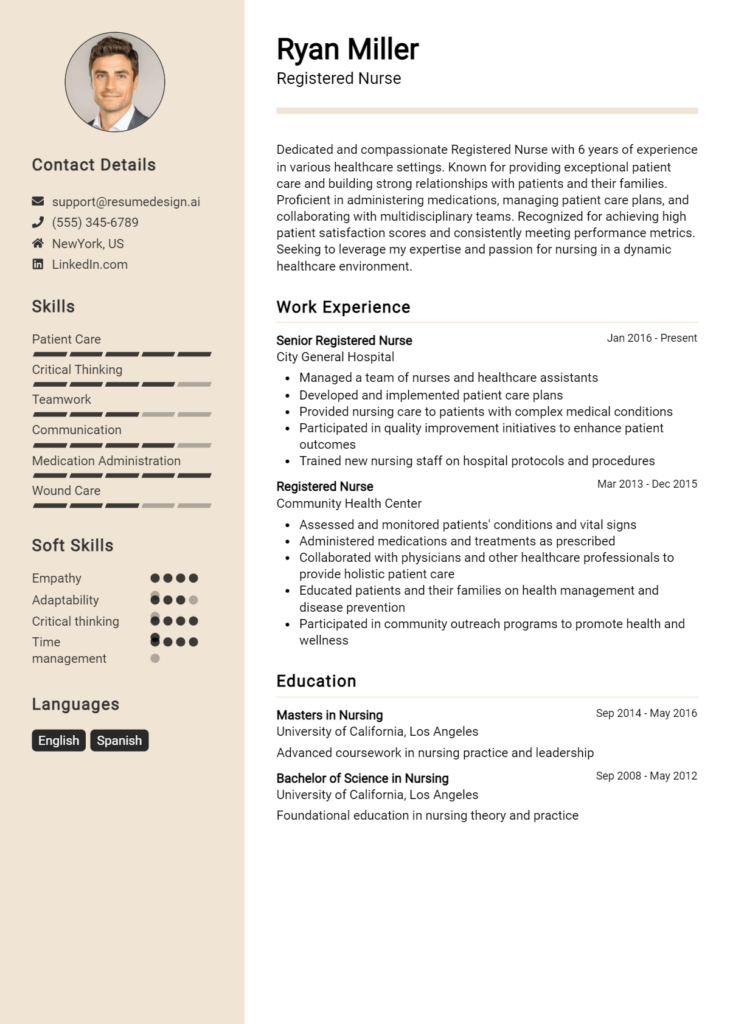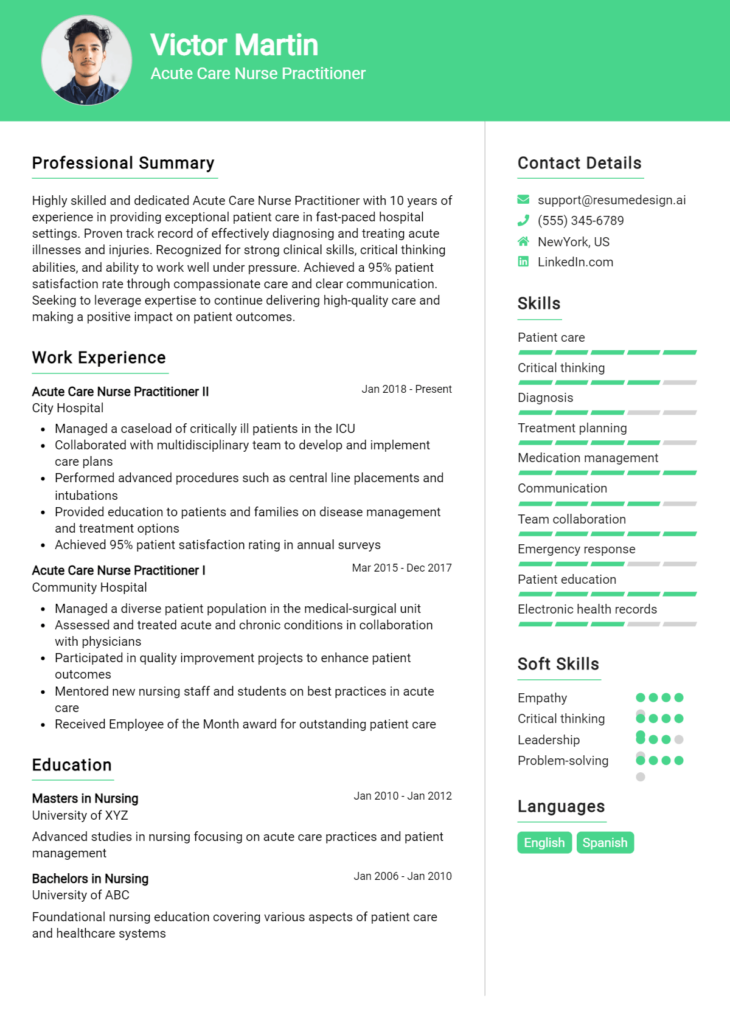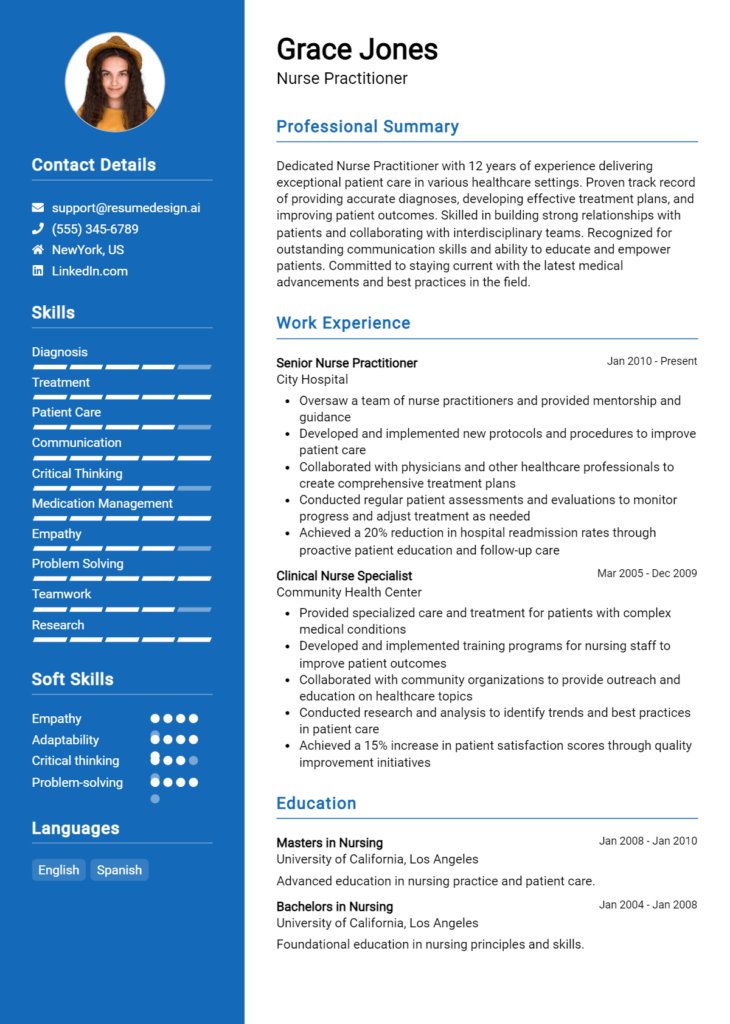Hospice Nurse Core Responsibilities
A Hospice Nurse plays a crucial role in providing compassionate care to patients with terminal illnesses, bridging the gap between medical, emotional, and psychological support. Key responsibilities include managing pain and symptoms, collaborating with interdisciplinary teams, and offering emotional support to families. Essential skills include technical proficiency in patient care, operational efficiency, and strong problem-solving abilities. These skills contribute significantly to the organization’s goals of enhancing quality of life and ensuring dignified end-of-life care. A well-structured resume can effectively highlight these qualifications, showcasing the candidate's readiness to fulfill this vital role.
Common Responsibilities Listed on Hospice Nurse Resume
- Administer medications and treatments as prescribed.
- Monitor patient conditions and report changes to the medical team.
- Provide emotional support to patients and their families.
- Develop and implement individualized care plans.
- Coordinate with physicians, social workers, and chaplains.
- Educate families on end-of-life care and bereavement.
- Perform wound care and other nursing procedures.
- Document patient care and maintain accurate records.
- Participate in interdisciplinary team meetings.
- Assist in grief counseling and support groups.
- Ensure compliance with healthcare regulations and policies.
- Advocate for patient needs and preferences.
High-Level Resume Tips for Hospice Nurse Professionals
In the competitive field of hospice nursing, a well-crafted resume is not just a formality; it’s a critical tool that can make or break your chances of landing an interview. As the first impression a potential employer has of you, your resume should effectively reflect your skills, experiences, and achievements in a way that resonates with their needs. For hospice nurse professionals, this means highlighting your compassionate care approach, clinical expertise, and ability to work in emotionally challenging environments. In this guide, we will provide practical and actionable resume tips specifically tailored for hospice nurse professionals to help you stand out in a crowded job market.
Top Resume Tips for Hospice Nurse Professionals
- Tailor your resume to each job description by incorporating relevant keywords and phrases that match the specific requirements and responsibilities outlined in the posting.
- Showcase your relevant nursing experience, emphasizing positions where you provided end-of-life care, pain management, or emotional support to patients and families.
- Quantify your achievements when possible, such as the number of patients you cared for, improvements in patient satisfaction scores, or successful implementation of care plans.
- Highlight industry-specific skills, such as palliative care, symptom management, and communication skills, to demonstrate your expertise in the hospice field.
- Include certifications and specialized training relevant to hospice care, such as certification in hospice and palliative nursing (CHPN) or advanced directives training.
- Use a clean, professional format that enhances readability, ensuring your most important information stands out and is easy for hiring managers to locate.
- Incorporate testimonials or quotes from supervisors or colleagues that reflect your compassionate care and professional dedication.
- Keep your resume concise, ideally one page, focusing on the most relevant and impactful experiences that align with the hospice nursing role.
- Consider including a summary statement at the top that encapsulates your passion for hospice nursing and your commitment to providing quality patient care.
By implementing these tips, hospice nurse professionals can significantly enhance their resumes, improving their chances of making a lasting impression on potential employers. A well-structured resume that highlights your unique qualifications and compassionate approach to care will set you apart in the competitive job market, ultimately increasing your likelihood of securing that coveted position in hospice nursing.
Why Resume Headlines & Titles are Important for Hospice Nurse
In the competitive field of healthcare, particularly in hospice care, the role of a Hospice Nurse is both critical and specialized. A well-crafted resume headline or title is an essential element that can significantly influence a hiring manager's first impression. A strong headline not only grabs attention but also encapsulates a candidate's key qualifications in a concise and impactful manner. It serves as a brief summary of the applicant's expertise, experience, and suitability for the role, making it imperative that the headline is relevant and directly aligned with the job being applied for.
Best Practices for Crafting Resume Headlines for Hospice Nurse
- Keep it concise: Aim for a headline that is brief and to the point, ideally no longer than 10-12 words.
- Be role-specific: Ensure the headline clearly reflects the position of Hospice Nurse and relevant specialties.
- Highlight key qualifications: Include specific skills or certifications that set you apart from other candidates.
- Use impactful language: Choose strong action verbs or descriptive adjectives to convey your strengths.
- Avoid clichés: Steer clear of overused phrases that do not add value or clarity.
- Tailor for each application: Customize your headline to align with the specific job description and requirements.
- Incorporate keywords: Use industry-relevant keywords to improve visibility in applicant tracking systems.
- Showcase accomplishments: If applicable, mention a notable achievement that reflects your expertise in hospice care.
Example Resume Headlines for Hospice Nurse
Strong Resume Headlines
Compassionate Hospice Nurse with 5+ Years of Palliative Care Experience
Certified Hospice and Palliative Care Nurse Dedicated to Patient-Centered Care
Experienced Hospice Nurse Specializing in End-of-Life Care and Family Support
Empathetic Nurse Leader with Proven Track Record in Hospice Care Management
Weak Resume Headlines
Nurse Looking for Work
Healthcare Professional
Experienced Nurse
Strong headlines are effective because they convey specific competencies and experiences that resonate with hiring managers, establishing the candidate as a qualified and focused applicant right away. In contrast, weak headlines lack specificity and fail to capture attention; they do not provide any insight into the candidate's unique qualifications or suitability for the hospice nursing role. By crafting a compelling and targeted headline, candidates can enhance their chances of standing out in a crowded job market.
Writing an Exceptional Hospice Nurse Resume Summary
In the competitive field of hospice nursing, a well-crafted resume summary is essential for making a strong first impression. This brief, yet powerful section of your resume serves as an introduction to your qualifications, highlighting your key skills, relevant experience, and notable accomplishments in a concise manner. A strong resume summary quickly captures the attention of hiring managers, allowing them to see at a glance why you are a strong candidate for the role. It is crucial that this summary is impactful and tailored to the specific job you are applying for, ensuring that it resonates with the employer's needs and expectations.
Best Practices for Writing a Hospice Nurse Resume Summary
- Quantify Achievements: Use numbers and specific outcomes to demonstrate your impact and effectiveness in previous roles.
- Focus on Relevant Skills: Highlight key skills that are particularly relevant to hospice care, such as patient assessment, pain management, and emotional support.
- Tailor for the Job Description: Customize your summary for each job application by aligning your skills and experiences with the specific requirements of the role.
- Keep it Concise: Aim for 3-5 sentences that effectively summarize your qualifications without overwhelming the reader.
- Use Action Words: Begin sentences with strong action verbs to convey your accomplishments and proactive approach.
- Highlight Certifications: Mention any relevant certifications or training that enhance your qualifications as a hospice nurse.
- Show Empathy and Compassion: Emphasize your ability to provide compassionate care, as this is critical in hospice settings.
Example Hospice Nurse Resume Summaries
Strong Resume Summaries
Compassionate and dedicated hospice nurse with over 8 years of experience in palliative care, recognized for enhancing patient comfort and family support through effective pain management strategies, resulting in a 30% increase in patient satisfaction scores.
Detail-oriented hospice nurse with a proven track record of managing care for terminally ill patients, achieving a reduction in hospital readmissions by 25% through proactive symptom management and effective patient education.
Licensed hospice nurse with expertise in interdisciplinary collaboration, providing holistic care that addresses the physical, emotional, and spiritual needs of patients and families, leading to improved quality of life outcomes.
Weak Resume Summaries
Experienced nurse looking for a hospice position, capable of providing care to patients.
Nursing professional with some experience in hospice care, seeking a challenging role in a healthcare setting.
The strong resume summaries are effective because they provide specific examples of achievements and skills relevant to the hospice nursing role, making them impactful and memorable. They quantify results, demonstrating the candidate's contributions to patient care and satisfaction. In contrast, the weak summaries are vague and generic, lacking detail and quantifiable outcomes, which fail to capture the attention of hiring managers or showcase the candidate's true potential in the field of hospice nursing.
Work Experience Section for Hospice Nurse Resume
The work experience section of a Hospice Nurse resume is critical as it serves as a comprehensive showcase of the candidate's technical skills, teamwork capabilities, and commitment to delivering high-quality patient care. This section not only highlights the nurse's clinical expertise but also reflects their ability to manage multidisciplinary teams and navigate complex care scenarios effectively. By quantifying achievements and aligning experiences with industry standards, candidates can better demonstrate their qualifications and readiness for the challenges faced in hospice care settings, ultimately positioning themselves as strong contenders for the role.
Best Practices for Hospice Nurse Work Experience
- Utilize action verbs to describe responsibilities and achievements.
- Quantify results whenever possible, such as improvements in patient satisfaction or reductions in hospital readmissions.
- Highlight specific technical skills relevant to hospice care, such as pain management or symptom control.
- Showcase collaborative efforts with interdisciplinary teams to enhance patient outcomes.
- Include certifications or specialized training that support your expertise.
- Tailor your experiences to reflect the requirements of the hospice nursing role you are applying for.
- Use concise and clear language to communicate complex medical concepts effectively.
- Demonstrate leadership in managing care plans or mentoring junior staff.
Example Work Experiences for Hospice Nurse
Strong Experiences
- Implemented a new pain management protocol that resulted in a 30% increase in patient-reported comfort scores over six months.
- Led a team of nurses in the development and execution of individualized care plans, improving patient adherence by 25%.
- Collaborated with social workers and physicians to streamline patient transitions to hospice care, reducing admission delays by 40%.
- Mentored 5 new hospice nurses, enhancing their clinical skills and improving team efficiency by 15%.
Weak Experiences
- Responsible for patient care and documentation.
- Worked with other staff to provide support in a healthcare setting.
- Assisted in daily tasks related to patient management.
- Participated in team meetings.
The examples listed as strong experiences are considered impactful due to their specificity, quantifiable results, and demonstration of leadership and collaboration skills. They provide clear evidence of the candidate's ability to improve patient outcomes and manage complex care processes effectively. In contrast, the weak experiences lack detail and measurable achievements, making them less compelling and failing to illustrate the nurse's true capabilities and contributions within the hospice care environment.
Education and Certifications Section for Hospice Nurse Resume
The education and certifications section of a Hospice Nurse resume is crucial as it serves to demonstrate the candidate's academic foundation and professional qualifications. This section not only showcases the formal education received but also highlights industry-specific certifications that are essential for providing quality end-of-life care. By including relevant coursework and specialized training, candidates can effectively illustrate their commitment to continuous learning and adherence to industry standards. This attention to detail greatly enhances their credibility and shows alignment with the specific requirements of the hospice nursing role, making them more appealing to potential employers.
Best Practices for Hospice Nurse Education and Certifications
- List relevant degrees, such as a Bachelor of Science in Nursing (BSN) or a Master of Science in Nursing (MSN).
- Include certifications specific to hospice care, such as the Certified Hospice and Palliative Nurse (CHPN) credential.
- Highlight any specialized training in pain management, grief counseling, or palliative care.
- Provide details about continuous education courses related to hospice and end-of-life care.
- Ensure all entries are up-to-date, reflecting current certifications and recent coursework.
- Use clear formatting to make the section easy to read, utilizing bullet points for clarity.
- Tailor the education and certifications section to align with the specific job description and requirements.
- Consider including professional memberships in relevant organizations, such as the National Hospice and Palliative Care Organization (NHPCO).
Example Education and Certifications for Hospice Nurse
Strong Examples
- Bachelor of Science in Nursing (BSN), University of Health Sciences, 2015
- Certified Hospice and Palliative Nurse (CHPN), 2021
- Advanced Pain Management Training, Palliative Care Institute, 2022
- Coursework in Grief Counseling and Support, Online University, 2020
Weak Examples
- Associate Degree in Arts, Community College, 2010
- Basic Life Support (BLS) Certification, 2015 (not specific to hospice care)
- Nursing Certification from a non-accredited institution, 2018
- Outdated CPR Certification, 2016
The strong examples listed provide a clear connection to the hospice nursing role, demonstrating relevant education and certifications that align with the job's requirements. They reflect a commitment to specialized knowledge and skills in hospice care. Conversely, the weak examples include qualifications that are either outdated, irrelevant, or not directly connected to the hospice nursing field, which may undermine the candidate's suitability for the role.
Top Skills & Keywords for Hospice Nurse Resume
As a Hospice Nurse, showcasing the right skills on your resume is crucial for demonstrating your ability to provide compassionate care to patients and support to their families during difficult times. Hospice nursing requires a unique blend of technical knowledge and interpersonal abilities, making it essential to highlight both hard and soft skills that align with the demands of this role. A well-crafted resume not only emphasizes your qualifications but also reflects your dedication to enhancing patient quality of life and ensuring comfort in their final days. By focusing on relevant skills, you can better position yourself as an ideal candidate for this emotionally rewarding profession.
Top Hard & Soft Skills for Hospice Nurse
Soft Skills
- Compassionate care
- Effective communication
- Emotional resilience
- Active listening
- Empathy
- Team collaboration
- Problem-solving
- Time management
- Patience
- Critical thinking
- Advocacy for patients
- Cultural sensitivity
- Conflict resolution
- Flexibility
- Stress management
- Interpersonal skills
- Attention to detail
- Trust-building
Hard Skills
- Patient assessment
- Palliative care techniques
- Pain management
- Medication administration
- Wound care
- IV therapy
- End-of-life care planning
- Knowledge of hospice regulations
- Electronic health records (EHR) management
- Vital signs monitoring
- Infection control protocols
- Advanced care planning
- Nutritional support
- Symptom management
- Care coordination
- Family counseling
- CPR and emergency response
- Clinical documentation
By emphasizing these essential skills in your resume and work experience, you can effectively convey your qualifications and commitment to providing high-quality hospice care.
Stand Out with a Winning Hospice Nurse Cover Letter
Dear [Hiring Manager's Name],
I am writing to express my interest in the Hospice Nurse position at [Company Name], as advertised on [where you found the job listing]. With a solid background in nursing and a deep commitment to providing compassionate end-of-life care, I am eager to contribute my skills and expertise to your esteemed team. My experience in hospice care has equipped me with the ability to support not only patients but also their families during one of the most challenging times in their lives.
In my previous role at [Previous Employer], I provided comprehensive nursing care to patients with terminal illnesses, focusing on pain management and emotional support. I collaborated with interdisciplinary teams to develop and implement individualized care plans that respected the wishes and dignity of each patient. My ability to communicate effectively with patients and their families helped build trust and fostered an environment of comfort. I have also facilitated family meetings to address concerns and ensure that loved ones were equipped with the necessary resources for caregiving and grieving.
I am particularly drawn to [Company Name] because of its commitment to providing holistic care and support for patients and their families. I admire your focus on patient-centered care and your dedication to enhancing the quality of life for those facing terminal illnesses. I am excited about the opportunity to bring my experience in palliative care and my passion for nursing to your organization. I believe that my empathetic approach and proactive problem-solving skills will make a positive impact on your team and the families you serve.
Thank you for considering my application. I look forward to the opportunity to discuss how my background, skills, and passion for hospice care can contribute to the exceptional services at [Company Name]. I am eager to be a part of a team that prioritizes compassion and dignity in every aspect of care.
Sincerely,
[Your Name]
[Your Contact Information]
[Your LinkedIn Profile or Professional Website, if applicable]
Common Mistakes to Avoid in a Hospice Nurse Resume
Crafting a resume as a Hospice Nurse requires a thoughtful approach, as this role involves specialized skills and compassionate care for patients in their final stages of life. Unfortunately, many candidates make common mistakes that can hinder their chances of landing the job. By being aware of these pitfalls, you can create a more effective resume that highlights your qualifications and experiences in this sensitive field. Here are some common mistakes to avoid:
Vague Job Descriptions: Failing to provide specific details about your previous roles can make it difficult for employers to understand your relevant experience. Always include quantifiable achievements and responsibilities.
Ignoring Keywords: Many healthcare organizations use applicant tracking systems (ATS) to filter resumes. Not incorporating relevant keywords from the job description can result in your resume being overlooked.
Overly Complicated Language: Using jargon or overly technical terms can alienate hiring managers. Aim for clear, concise language that conveys your expertise without being convoluted.
Neglecting Soft Skills: While technical skills are important, hospice nursing is heavily reliant on empathy and communication. Make sure to highlight your soft skills alongside your clinical competencies.
Lack of Tailoring: Submitting a generic resume can be a major mistake. Take the time to customize your resume for each position, emphasizing the skills and experiences most relevant to the specific hospice role.
Forgetting Certifications and Licenses: Failing to mention your nursing license, certifications, or specialized training in palliative care is a missed opportunity. These credentials are critical in the hospice field and should be prominently displayed.
Omitting Volunteer Experience: Many hospice nurses gain invaluable experience through volunteer work. Don’t overlook including relevant volunteer roles that demonstrate your commitment to end-of-life care.
Poor Formatting: A cluttered or confusing format can detract from your qualifications. Use a clean, professional layout that allows for easy reading and highlights the most important information.
Conclusion
As a Hospice Nurse, your role is vital in providing compassionate care and support to patients and their families during challenging times. Throughout this article, we have discussed the essential skills and qualities required for this position, including empathy, effective communication, and clinical expertise. Additionally, we highlighted the importance of a well-crafted resume that showcases your unique experiences and qualifications, helping you stand out in a competitive job market.
In conclusion, it's crucial to regularly review and update your Hospice Nurse resume to reflect your evolving skills and experiences. A polished resume will not only demonstrate your professionalism but also your dedication to providing exceptional patient care.
To assist you in this process, consider utilizing various resources available to enhance your resume. Explore our collection of resume templates to find a design that resonates with your personal style. For a more tailored approach, try our resume builder that guides you through creating a standout resume. Additionally, reviewing resume examples can provide inspiration and help you formulate the best way to present your qualifications. Finally, don’t forget to complement your resume with a compelling cover letter by checking out our cover letter templates.
Take action today—revise your resume and ensure it reflects your dedication and passion as a Hospice Nurse. Your next opportunity awaits!

